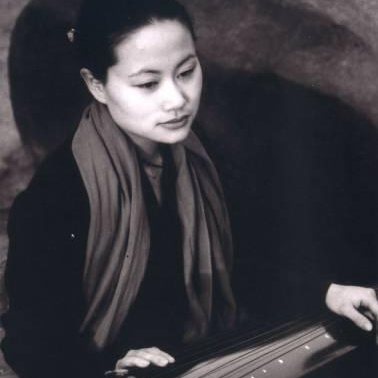Wu Na
Organized by 风月呢喃 on 2022-05-16

Wu Na (Wu Na, born in 1979), born in Chongqing, started learning Guqin at the age of 9. In 1991, he was admitted to the middle school attached to the Central Conservatory of Music, majoring in guqin, under the tutelage of guqin performer Ms. Zhao Jiazhen. In 2004, he graduated from the postgraduate department of the Central Conservatory of Music, under the tutelage of Mr. Li Xiangting, a famous guqin performer and educator, and became the first graduate student of the Central Conservatory of Music majoring in guqin performance. In 2015, he entered the School of Music of Capital Normal University as a teacher of Guqin. Created the first Guqin online education platform in China - Man Xuetang.
She is an active crossover performer, constantly collaborating with music artists in the fields of jazz, rock, and experimentation. At the same time, he also played ancient tunes according to his own understanding and explored the meaning of guqin improvisation in contemporary life. Year round performances in Asia, Europe, the United States and other countries. In March 2008, he was awarded the "Asian Cultural Council-Asian Cultural Council" foundation scholarship in the United States and went to New York, the United States as a five-month visiting scholar to investigate and study the situation of Western contemporary art and music. In 2010, the series "Guqin Theater - Wu Na's Selected Works" was launched, inviting artists and musicians from all over the world to have a dialogue with Guqin.
Similar artist
Yang Qing, a famous guqin master and music educator, was born in August 1951.
read >>
Ni Shiyun, a native of Haimen District, Nantong City, Jiangsu Province, China's famous contemporary qin mojo, the fourth generation inheritor of the Mei 'an Qin School, the representative inheritor of the intangible cultural heritage of Jiangsu Province "Guqin art" (Mei 'an Qin school), serves as the director of the Chinese Kunqu Opera Guqin Research Institute and the executive director of the Chinese Qin Association.
read >>
Yang Qiong, the word Yu Rong, Yushan Qin school successor, South Yuqin Club president, operation aman for more than ten years, good at qin songs. He is currently the vice president of Shenzhen Guqin Association, member of Shenzhen Ethnic Orchestral Association, lecturer of Shenzhen University School of Continuing Education and so on.
read >>
Yang Zhijian, Guqin maker and performer. Born in Shanghai in July 1974. National first-class performer; representative inheritor of Shanghai intangible cultural heritage "Guqin-making skills"; vice-chairman of Shanghai Intangible Cultural Heritage Protection Association. Winner of "Shanghai Craftsman" and "May 1st Labor Medal" in 2017.
read >>
Huang Deyuan, inheritor of the intangible cultural heritage "Zhejiang style guqin" and "Wenzhou dialect recitation".
read >>
Involving musical instruments
Guqin (pinyin: Gǔ Qín) is a traditional Chinese musical instrument with a history of at least 3,500 years. Guqin is also known as Yaoqin, Yuqin and Seven-stringed Qin. The guqin has 13 emblems that mark the rhythm, and is also a ritual and musical instrument. It belongs to the silk in the octave. Guqin has a wide range, deep timbre and long aftertone.
Involved portfolio
Involved news
Organized by 陆晨 on 2025-04-17
The guqin, as a treasure of traditional Chinese culture, with its unique timbre and profound cultural background, has become a choice for many people to pursue inner peace. However, for many enthusiasts, how to squeeze out time from a busy schedule to self-study the guqin is no small challenge.
read >>
Organized by 苏肆 on 2025-04-03
In the long river of ancient Chinese music, Guqin occupies an irreplaceable position with its profound cultural connotation and unique timbre. Among the many famous Guqin songs, "Snow White" is like a bright pearl, with its quiet and elegant style, it has become a classic beloved by scholars of all ages.
read >>
Organized by 没头脑 on 2025-03-31
"Autumn Wild Geese" is a brilliant gem in the treasure house of ancient Chinese guqin music. It is not only renowned worldwide for its profound and distant artistic conception, but also has become a classic work passed down by later generations due to its unique artistic charm and profound ideological connotation.
read >>
Organized by 天井 on 2025-03-07
The guqin, as a treasure among traditional Chinese musical instruments, with its profound timbre and rich cultural connotations, has become an important medium for scholars and refined people to cultivate their character and express their sentiments. Among the numerous guqin pieces, "Pu'an Zuo" stands out as a highly representative work with its unique Buddhist background and the distant and meditative musical style.
read >>
Organized by 肖毅 on 2025-02-26
In the vast starry sky of Chinese classical music, guqin pieces occupy an important place with their profound cultural background and unique artistic charm. Among them, "The Four Scenic Views" is a highly representative work that not only showcases the exquisite and far-reaching artistic conception of guqin music but also leads the listener into a world brimming with vitality and vigor.
read >>

 渝公网安备 50010702504639号
渝公网安备 50010702504639号